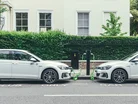Strategies for the EV transition, according to Volkswagen

As the Fleet EV Product Manager at Volkswagen Financial Services Fleet, David Watts is an experienced fleet industry professional, who specialises in safe and efficient fleet management. Here, he shares his thoughts on 2023 and offers some predictions for 2024.
EV transitions, challenges and solutions in 2024
The EV market has continued to grow in 2023, with the majority of businesses beginning, continuing or accelerating their transition to a sustainable fleet. Although the government pushed back the ban on the sale of new petrol and diesel only cars and vans by five years to 2035, the Zero Emissions Vehicle (ZEV) mandate is still set to go ahead.
“This means that 80% of new cars and 70% of new vans sold in the UK must be zero emission by 2030 – which is a key reason why many businesses are still pushing on with their EV transitions,” said Watts.
In 2024, almost every fleet with passenger cars will be looking to maintain the momentum of their EV transition journey to materialise anticipated carbon and cost savings. To stay on track, that journey needs to be supported by a clear transition strategy.
“When it comes to business charging infrastructure, it’s also essential that businesses are designing and implementing a solution that’s fit for the future. As EV adoption continues to grow, so too will demand for on-site workplace and depot charging, and business’ charging infrastructure plans need to be equipped to support this.”
Alongside this, businesses are also grappling with the challenge of ensuring EV drivers are fairly reimbursed for business mileage. From December 2023, the government’s new Advisory Fuel Rates (AFR) came into force, which saw the Advisory Electricity Rate (AER) for EV mileage reimbursement cut from 10p to 9p per mile.
“However, with drivers using a combination of home, workplace and public charging – all at different price points – implementing a uniform reimbursement rate is not equally fair to every employee,” Watts continues. “For example, for those unable to access home charging at off-peak tariff rates, the current AER can leave them out of pocket for business mileage. Businesses instead need to establish where and how their drivers are charging their EVs and develop a cost reconciliation and reimbursement strategy that aligns with this. This will likely include implementing a multi-network charge card (the EV equivalent of a multi-brand fuel card) for example, as well as a home energy cost solution.”
*********************************************
EV Magazine is dedicated to creating a global community of businesses, experts, and EV enthusiasts with comprehensive insights into automotive and the surrounding sectors.
For more EV insights check out the latest edition of EV Magazine and be sure to follow us on LinkedIn & Twitter.
You may also be interested in Sustainability Magazine and Energy Digital Magazine.
*********************************************
BizClik is a global provider of B2B digital media platforms that cover Executive Communities for CEOs, CFOs, CMOs, Sustainability Leaders, Procurement & Supply Chain Leaders, Technology & AI Leaders, Cyber Leaders, FinTech & InsurTech Leaders as well as covering industries such as Manufacturing, Mining, Energy, EV, Construction, Healthcare + Food & Drink.
BizClik – based in London, Dubai, and New York – offers services such as Content Creation, Advertising & Sponsorship Solutions, Webinars & Events.
- BYD Surpasses Tesla in Quarterly Sales Amid EV Market ShakeuMobility
- SMMT: Car Manufacturing Challenges Amid Industry PressureMobility
- Charge Gully: Bridge EV Gaps for Deprived AreasCharging & Infrastructure
- Emporia & Treehouse Simplify Home EV Charging & InstallationCharging & Infrastructure

